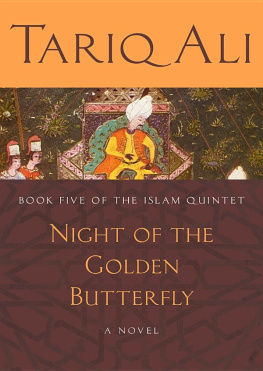Tariq Ali - Shadows of the Pomegranate Tree
Here you can read online Tariq Ali - Shadows of the Pomegranate Tree full text of the book (entire story) in english for free. Download pdf and epub, get meaning, cover and reviews about this ebook. genre: Prose. Description of the work, (preface) as well as reviews are available. Best literature library LitArk.com created for fans of good reading and offers a wide selection of genres:
Romance novel
Science fiction
Adventure
Detective
Science
History
Home and family
Prose
Art
Politics
Computer
Non-fiction
Religion
Business
Children
Humor
Choose a favorite category and find really read worthwhile books. Enjoy immersion in the world of imagination, feel the emotions of the characters or learn something new for yourself, make an fascinating discovery.
Shadows of the Pomegranate Tree: summary, description and annotation
We offer to read an annotation, description, summary or preface (depends on what the author of the book "Shadows of the Pomegranate Tree" wrote himself). If you haven't found the necessary information about the book — write in the comments, we will try to find it.
Shadows of the Pomegranate Tree — read online for free the complete book (whole text) full work
Below is the text of the book, divided by pages. System saving the place of the last page read, allows you to conveniently read the book "Shadows of the Pomegranate Tree" online for free, without having to search again every time where you left off. Put a bookmark, and you can go to the page where you finished reading at any time.
Font size:
Interval:
Bookmark:
Tariq Ali
Shadows of the Pomegranate Tree
For Aisha, Chengiz and Natasha
~ ~ ~
THE BANU HUDAYL in 1499 AD
The clan of Hassan al-Hudayl left Dimashk in 237 AH932 AD and reached the Western outposts of Islam in the same year. They settled near Gharnata and in the following year began to build the village which bore their name. The mansion was constructed three years later by stonemasons who had built the Medina al-Zahara near Qurtuba.


Authors Note
IN MOORISH SPAIN, AS in the Arab World today, children received a given name, and were further identified by the name of their father or mother. In this narrative Zuhayr bin Umar is Zuhayr, son of Umar; Asma bint Dorothea is Asma, daughter of Dorothea. A mans public name might simply identify him as the son of his father Ibn Farid, Ibn Khaldun, son of Farid, of Khaldun. The Moors in this story use their own names for cities which now bear Spanish names, including several that were founded by the Moors themselves. These names, and some common Moorish words, are explained in the Glossary on p. 242.
Prologue
THE FIVE CHRISTIAN KNIGHTS summoned to the apartment of Ximenes de Cisneros did not welcome the midnight call. Their reaction had little to do with the fact that it was the coldest winter in living memory. They were veterans of the Reconquest. Troops under their command had triumphantly marched into Gharnata seven years before and occupied the city in the name of Ferdinand and Isabella.
None of the five men belonged to the region. The oldest amongst them was the natural son of a monk in Toledo. The others were Castilians and desperate to return to their villages. They were all good Catholics, but did not want their loyalty taken for granted, not even by the Queens confessor. They knew how he had had himself transferred from Toledo where he was the Archbishop to the conquered city. It was hardly a secret that Cisneros was an instrument of Queen Isabella. He wielded a power that was not exclusively spiritual. The knights were only too well aware how a defiance of his authority would be viewed by the Court.
The five men, wrapped in cloaks but still shivering from the cold, were shown into Cisneros bed-chamber. The austerity of the living conditions surprised them. Looks were exchanged. For a prince of the Church to inhabit quarters more suited to a fanatical monk was unprecedented. They were not yet used to a prelate who lived as he preached. Ximenes looked up at them and smiled. The voice which gave them their instructions had no clang of command. The knights were taken aback. The man from Toledo whispered loudly to his companions: Isabella has entrusted the keys of the pigeon-house to a cat.
Cisneros chose to ignore this display of insolence. Instead, he raised his voice slightly.
I wish to make it clear that we are not interested in the pursuit of any personal vendettas. I speak to you with the authority of both Church and Crown.
This was not strictly true, but soldiers are not accustomed to questioning those in authority. Once he was satisfied that his instruction had been fully understood, the Archbishop dismissed them. He had wanted to make it clear that the cowl was in command of the sword. A week later, on the first day of December in the year 1499, Christian soldiers under the command of five knight-commanders entered the one hundred and ninety-five libraries of the city and a dozen mansions where some of the better-known private collections were housed. Everything written in Arabic was confiscated.
The day before, scholars in the service of the Church had convinced Cisneros to exempt three hundred manuscripts from his edict. He had agreed, provided they were placed in the new library he was preparing to endow in Alcala. The bulk of these were Arab manuals of medicine and astronomy. They represented the major advances in these and related sciences since the days of antiquity. Here was much of the material which had travelled from the peninsula of al-Andalus as well as Sicily to the rest of Europe and paved the way for the Renaissance.
Several thousand copies of the Koran, together with learned commentaries and theological and philosophical reflections on its merits and demerits, all crafted in the most exquisite calligraphy, were carted away indiscriminately by the men in uniform. Rare manuscripts vital to the entire architecture of intellectual life in al-Andalus, were crammed in makeshift bundles on the backs of soldiers.
Throughout the day the soldiers constructed a rampart of hundreds of thousands of manuscripts. The collective wisdom of the entire peninsula lay in the old silk market below the Bab al-Ramla.
This was the ancient space where once Moorish knights used to ride and joust to catch the eye of their ladies; where the populace would assemble in large numbers, children riding on the shoulders of fathers, uncles and elder brothers as they cheered their favourites; where catcalls greeted the appearance of those who paraded in the armour of knights simply because they were creatures of the Sultan. When it was clear that a brave man had allowed one of the courtiers to win out of deference to the King or, just as likely, because he had been promised a purse full of gold dinars, the citizens of Gharnata jeered loudly. It was a citizenry well known for its independence of mind, rapier wit, and reluctance to recognize superiors. This was the city and this the place chosen by Cisneros for his demonstration of fireworks that night.
The sumptuously bound and decorated volumes were a testament to the arts of the Peninsulan Arabs, surpassing the standards of the monasteries of Christendom. The compositions they contained had been the envy of scholars throughout Europe. What a splendid pile was laid before the population of the town.
The soldiers who, since the early hours of the morning, had been building the wall of books had avoided the eyes of the Gharnatinos. Some onlookers were sorrowful, others tempestuous, eyes flashing, faces full of anger and defiance. Others still, their bodies swaying gently from side to side, wore vacant expressions. One of them, an old man, kept repeating the only sentence he could utter in the face of the calamity.
We are being drowned in a sea of helplessness.
Some of the soldiers, perhaps because they never had been taught to read or write, understood the enormity of the crime they were helping to perpetrate. Their own role troubled them. Sons of peasants, they recalled the stories they used to hear from their grandparents, whose tales of Moorish cruelty contrasted with accounts of their culture and learning.
There were not many of these soldiers, but enough to make a difference. As they walked down the narrow streets, they would deliberately discard a few manuscripts in front of the tightly sealed doors. Having no other scale of judgement, they imagined that the heaviest volumes must also be the weightiest. The assumption was false, but the intention was honourable, and the gesture was appreciated. The minute the soldiers were out of sight, a door would open and a robed figure would leap out, scoop up the books and disappear again behind the relative safety of locks and bars. In this fashion, thanks to the instinctive decency of a handful of soldiers, several hundred important manuscripts survived. They were subsequently transported across the water to the safety of personal libraries in Fes, and so were saved.
In the square it was beginning to get dark. A large crowd of reluctant citizens, mainly male, had been assembled by the soldiery. Muslim grandees and turbaned preachers mingled with the shopkeepers, traders, peasants, artisans and stall-holders, as well as pimps, prostitutes and the mentally unstable. All humanity was represented here.
Font size:
Interval:
Bookmark:
Similar books «Shadows of the Pomegranate Tree»
Look at similar books to Shadows of the Pomegranate Tree. We have selected literature similar in name and meaning in the hope of providing readers with more options to find new, interesting, not yet read works.
Discussion, reviews of the book Shadows of the Pomegranate Tree and just readers' own opinions. Leave your comments, write what you think about the work, its meaning or the main characters. Specify what exactly you liked and what you didn't like, and why you think so.















